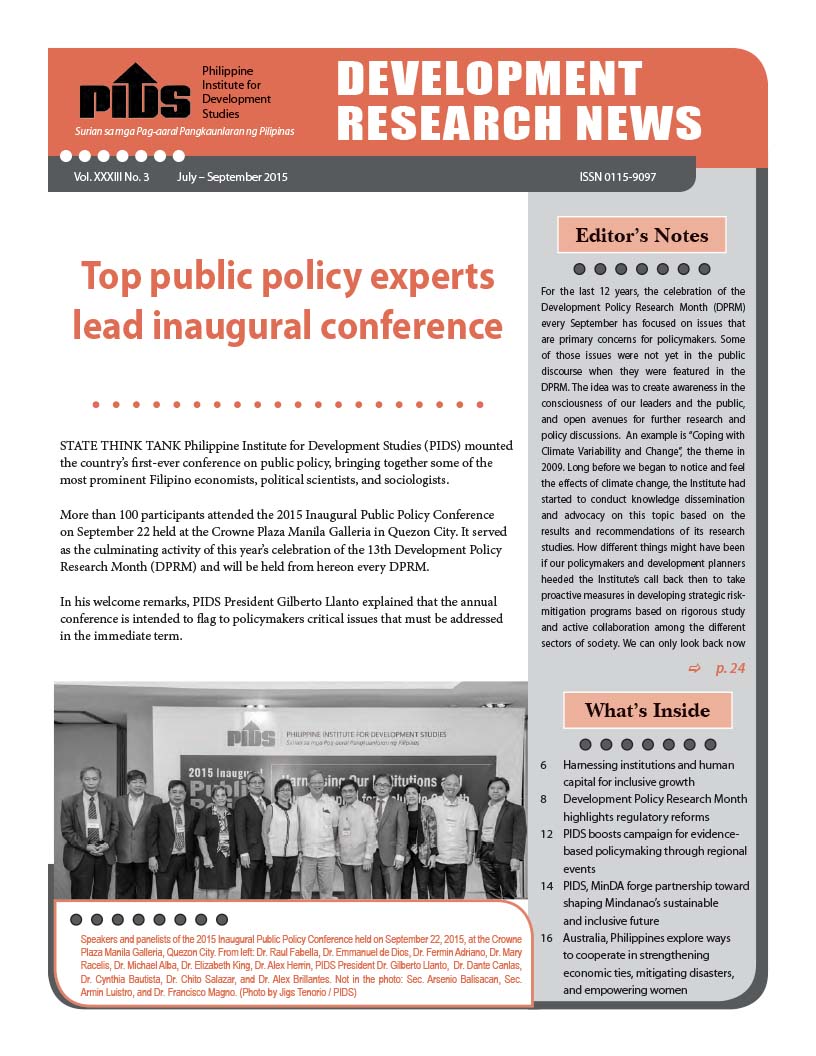THE changing of the guard at the National Economic and Development Authority (Neda) while the Philippines is battling a pandemic will have minimal impact on government operations and the economy, but some economists said this could discourage investors.
Most economists expressed confidence that the replacement of former Socioeconomic Planning Secretary Ernesto M. Pernia by Finance Undersecretary Karl Kendrick T. Chua is an assurance that the economy would remain intact.
University of the Philippines economist Toby Melissa C. Monsod told the BusinessMirror that the resignation of Pernia still leaves the Neda, as well as the Inter-Agency Task Force for the Management of Emerging Infectious Diseases (IATF-EID), intact.
“No worries. Neda bureaucracy is still intact, IATF is still intact. Karl Chua did his job well in DOF (Department of Finance). [There’s] no reason to think he won’t rise to the challenge,” Monsod said. Dr. Monsod is the daughter of former Socioeconomic Planning Secretary and first post-Edsa Neda director general Solita C. Monsod.
Philippine Institute for Development Studies (PIDS) Research Fellow Jose Ramon G. Albert added that prior to Pernia’s resignation, the Neda has already been preparing for the new normal.
Albert said efforts were already under way in devising strategies that can be used to run the economy after April 30. He said Chua, as acting Secretary of Neda, will provide some continuity to these strategies with a few “tweaks.”
“One of the strengths of Neda and many government institutions is that the bureaucracy is relatively insulated from big policy shifts that could arise from a changing of the guard,” Albert said.
Ateneo de Manila University John Gokongwei School of Management Dean Luis F. Dumlao said he believes Chua’s appointment is not a cause of concern. He said Chua was even an apprentice of Pernia at the UP School of Economics when Chua was taking his PhD.
Dumlao said Chua and Pernia also worked on a paper on population. “Hence, I expect minimum philosophical difference.”
‘Over-reading’ resignation
Action for Economic Reforms (AER) Coordinator Filomeno Sta. Ana III lamented that “pundits and analysts are over-reading” Pernia’s resignation. He said disagreements in the Cabinet are normal, regardless of the administration.
Sta. Ana said what is important is that the administration was able to take a “unified position” when it came to key economic reforms, particularly on taxes, rice tariffication, universal health care, anti-red tape measures, and liberalizing investments, among others.
He said Chua, who is a “general” of Finance Secretary Carlos G. Dominguez III, played a major role in the tax reform measures and has earned the respect of the civil society, academe, and the country’s development partners.
“Surely, disagreements happen in the same manner that husband and wife disagree. But these are points that neither impede nor reverse the goals and direction where they agree,” Sta. Ana said. “[On Chua] It’s high time we had young blood in leadership.”
Former Socioeconomic Planning Secretaries Romulo L. Neri and Cielito F. Habito both expressed confidence that the economy will weather this storm and agreed that Chua is a good fit.
Neri served as Neda chief under former President Gloria Macapagal-Arroyo; and Habito, under President Fidel V. Ramos.
Neri, who is a first cousin of Pernia, said the resignation of Pernia from Neda may be due to exhaustion “with all the pressures.” This break from government, Neri said, may improve Pernia’s health.
Habito, meanwhile, said he respected Pernia’s decision to step down as well as his reasons for resigning as Neda Secretary. This will not significantly affect the economy as Chua will “have a short learning curve.”
He added that Chua’s age (41) will not be a hindrance in running Neda. Habito was the youngest appointed Neda Director General in the country’s history, at 39 years old.
“I was 39 when appointed to lead Neda and I didn’t think that to be an issue. What’s important is the right chemistry and teamwork among the economic team,” Habito told the BusinessMirror.
“Besides, I’ve always argued that it’s good to have a young person to be the chief planner, because he/she will still be around to suffer the consequences of bad planning, hence has a direct stake in doing the job well,” he added.
De La Salle University economist Maria Ella C. Oplas said Chua was a “promising technocrat” who was “young, brilliant, and knows what he is saying and proposing.” Oplas said Chua represented a new breed of leaders needed at this time as the country faces a pandemic.
Oplas noted, however, there are fears that his association with Dominguez would make him less independent with his views. Nonetheless, she considers Chua capable of being “his own man.”
She said Chua can easily draw from his experience at the World Bank and at the DOF. Oplas said Chua was able to make the public understand the tax reform program and this is very valuable.
“There are fears that he will be just a puppet of Secretary Dominguez. I hope not. I think he can be his own man if given a chance and his brilliance partnered with how he articulates his points. We will go a long way,” Oplas said. “His background in World Bank and DOF should give him a good background and experience. I’m giving him a chance.”
Reservations and resignations
University of Asia and the Pacific (UA&P) School of Economics Dean Cid Terosa said Pernia’s resignation sends a negative signal to the international community that all is not well in the President’s economic team.
The impression that there are clashing perspectives and irreconcilable differences at this time when the country is battling a pandemic is a concern, he added.
“Nonetheless, I believe that there won’t be major changes in economic policy since the economic team appears to be a closely knit group,” Terosa said.
Former UP School of Economics Dean Ramon L. Clarete told this newspaper that any breakup of the economic team at this time is a cause for concern.
On Chua’s appointment, Clarete said this is only in an acting capacity and the President may still appoint another person as Neda Secretary.
For his part, Ateneo de Manila University School of Government (ASOG) Dean Ronald U. Mendoza told the BusinessMirror that the resignation of the country’s chief economist at a time when the Philippines is entering a “very severe global economic slowdown” is a cause for concern.
Mendoza said Pernia was a “voice of reason” and provided stability to the President’s economic team by sharing his deep economic development perspectives.
“It is troubling to lose that independent voice at this crucial time when we need to give our people and our economic partners a signal of stability,” Mendoza said.
Navarro returns to PIDS
Meanwhile, with the resignation of Pernia, Neda Undersecretary for Regional Development Adoracion M. Navarro is also resigning and returning to the PIDS.
Prior to joining Neda, Navarro was Vice President of the PIDS and a research fellow for the state-owned think tank.
She said after only her first year in Neda, she already asked Pernia if she could return to PIDS. But Pernia requested her to extend her stay in Neda.
“I think now is a good time to go back to PIDS. I also want to give due courtesy to Secretary Chua and provide additional space for the team that he might be bringing in,” Navarro said.
As Neda Undersecretary for Regional Development, Navarro was tasked to lead the Regional Development Councils and play an active role in the formulation of the Boracay Action Plan and the rehabilitation and reconstruction of Marawi.
Most economists expressed confidence that the replacement of former Socioeconomic Planning Secretary Ernesto M. Pernia by Finance Undersecretary Karl Kendrick T. Chua is an assurance that the economy would remain intact.
University of the Philippines economist Toby Melissa C. Monsod told the BusinessMirror that the resignation of Pernia still leaves the Neda, as well as the Inter-Agency Task Force for the Management of Emerging Infectious Diseases (IATF-EID), intact.
“No worries. Neda bureaucracy is still intact, IATF is still intact. Karl Chua did his job well in DOF (Department of Finance). [There’s] no reason to think he won’t rise to the challenge,” Monsod said. Dr. Monsod is the daughter of former Socioeconomic Planning Secretary and first post-Edsa Neda director general Solita C. Monsod.
Philippine Institute for Development Studies (PIDS) Research Fellow Jose Ramon G. Albert added that prior to Pernia’s resignation, the Neda has already been preparing for the new normal.
Albert said efforts were already under way in devising strategies that can be used to run the economy after April 30. He said Chua, as acting Secretary of Neda, will provide some continuity to these strategies with a few “tweaks.”
“One of the strengths of Neda and many government institutions is that the bureaucracy is relatively insulated from big policy shifts that could arise from a changing of the guard,” Albert said.
Ateneo de Manila University John Gokongwei School of Management Dean Luis F. Dumlao said he believes Chua’s appointment is not a cause of concern. He said Chua was even an apprentice of Pernia at the UP School of Economics when Chua was taking his PhD.
Dumlao said Chua and Pernia also worked on a paper on population. “Hence, I expect minimum philosophical difference.”
‘Over-reading’ resignation
Action for Economic Reforms (AER) Coordinator Filomeno Sta. Ana III lamented that “pundits and analysts are over-reading” Pernia’s resignation. He said disagreements in the Cabinet are normal, regardless of the administration.
Sta. Ana said what is important is that the administration was able to take a “unified position” when it came to key economic reforms, particularly on taxes, rice tariffication, universal health care, anti-red tape measures, and liberalizing investments, among others.
He said Chua, who is a “general” of Finance Secretary Carlos G. Dominguez III, played a major role in the tax reform measures and has earned the respect of the civil society, academe, and the country’s development partners.
“Surely, disagreements happen in the same manner that husband and wife disagree. But these are points that neither impede nor reverse the goals and direction where they agree,” Sta. Ana said. “[On Chua] It’s high time we had young blood in leadership.”
Former Socioeconomic Planning Secretaries Romulo L. Neri and Cielito F. Habito both expressed confidence that the economy will weather this storm and agreed that Chua is a good fit.
Neri served as Neda chief under former President Gloria Macapagal-Arroyo; and Habito, under President Fidel V. Ramos.
Neri, who is a first cousin of Pernia, said the resignation of Pernia from Neda may be due to exhaustion “with all the pressures.” This break from government, Neri said, may improve Pernia’s health.
Habito, meanwhile, said he respected Pernia’s decision to step down as well as his reasons for resigning as Neda Secretary. This will not significantly affect the economy as Chua will “have a short learning curve.”
He added that Chua’s age (41) will not be a hindrance in running Neda. Habito was the youngest appointed Neda Director General in the country’s history, at 39 years old.
“I was 39 when appointed to lead Neda and I didn’t think that to be an issue. What’s important is the right chemistry and teamwork among the economic team,” Habito told the BusinessMirror.
“Besides, I’ve always argued that it’s good to have a young person to be the chief planner, because he/she will still be around to suffer the consequences of bad planning, hence has a direct stake in doing the job well,” he added.
De La Salle University economist Maria Ella C. Oplas said Chua was a “promising technocrat” who was “young, brilliant, and knows what he is saying and proposing.” Oplas said Chua represented a new breed of leaders needed at this time as the country faces a pandemic.
Oplas noted, however, there are fears that his association with Dominguez would make him less independent with his views. Nonetheless, she considers Chua capable of being “his own man.”
She said Chua can easily draw from his experience at the World Bank and at the DOF. Oplas said Chua was able to make the public understand the tax reform program and this is very valuable.
“There are fears that he will be just a puppet of Secretary Dominguez. I hope not. I think he can be his own man if given a chance and his brilliance partnered with how he articulates his points. We will go a long way,” Oplas said. “His background in World Bank and DOF should give him a good background and experience. I’m giving him a chance.”
Reservations and resignations
University of Asia and the Pacific (UA&P) School of Economics Dean Cid Terosa said Pernia’s resignation sends a negative signal to the international community that all is not well in the President’s economic team.
The impression that there are clashing perspectives and irreconcilable differences at this time when the country is battling a pandemic is a concern, he added.
“Nonetheless, I believe that there won’t be major changes in economic policy since the economic team appears to be a closely knit group,” Terosa said.
Former UP School of Economics Dean Ramon L. Clarete told this newspaper that any breakup of the economic team at this time is a cause for concern.
On Chua’s appointment, Clarete said this is only in an acting capacity and the President may still appoint another person as Neda Secretary.
For his part, Ateneo de Manila University School of Government (ASOG) Dean Ronald U. Mendoza told the BusinessMirror that the resignation of the country’s chief economist at a time when the Philippines is entering a “very severe global economic slowdown” is a cause for concern.
Mendoza said Pernia was a “voice of reason” and provided stability to the President’s economic team by sharing his deep economic development perspectives.
“It is troubling to lose that independent voice at this crucial time when we need to give our people and our economic partners a signal of stability,” Mendoza said.
Navarro returns to PIDS
Meanwhile, with the resignation of Pernia, Neda Undersecretary for Regional Development Adoracion M. Navarro is also resigning and returning to the PIDS.
Prior to joining Neda, Navarro was Vice President of the PIDS and a research fellow for the state-owned think tank.
She said after only her first year in Neda, she already asked Pernia if she could return to PIDS. But Pernia requested her to extend her stay in Neda.
“I think now is a good time to go back to PIDS. I also want to give due courtesy to Secretary Chua and provide additional space for the team that he might be bringing in,” Navarro said.
As Neda Undersecretary for Regional Development, Navarro was tasked to lead the Regional Development Councils and play an active role in the formulation of the Boracay Action Plan and the rehabilitation and reconstruction of Marawi.







